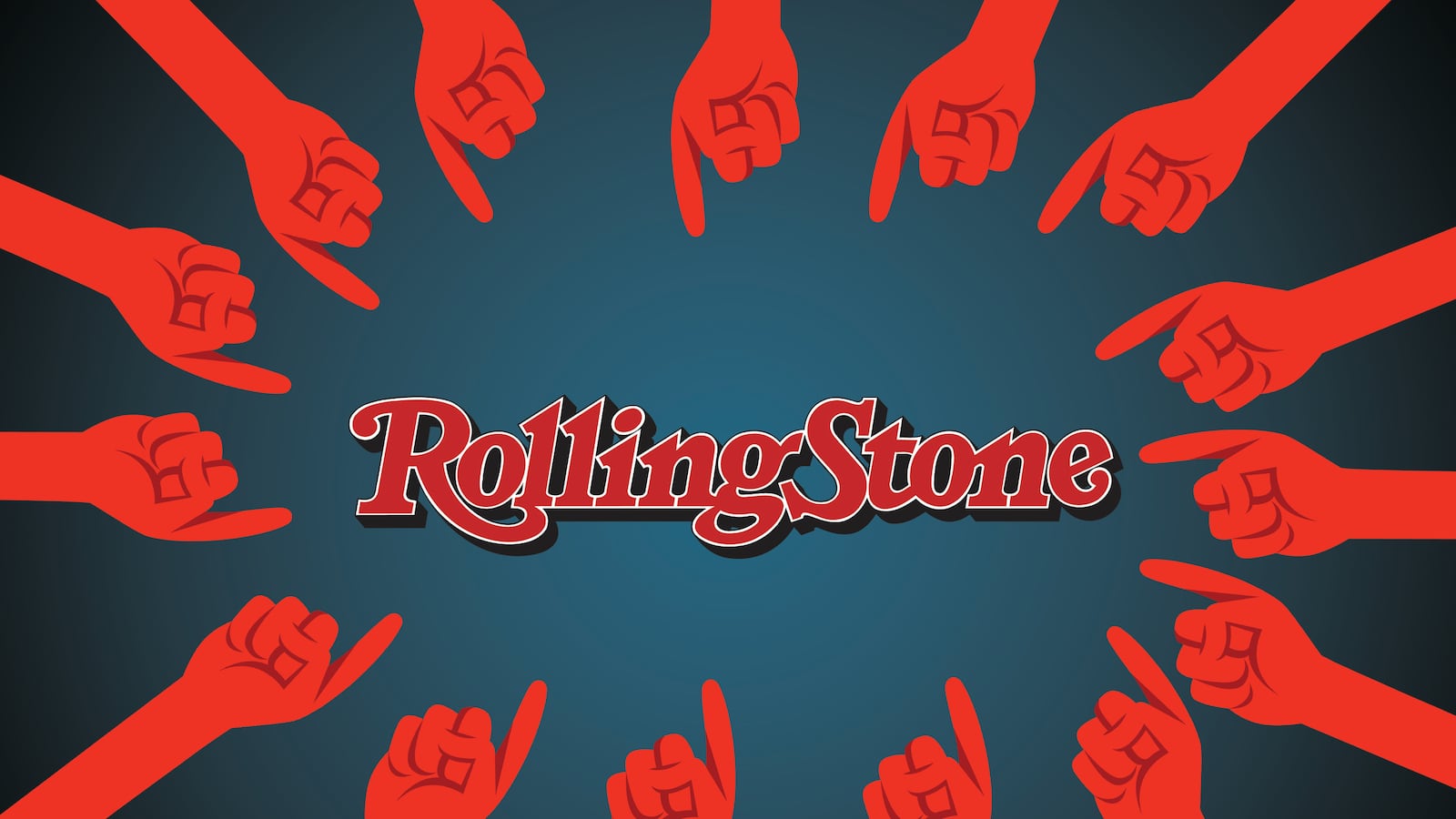You can criticize Sabrina Rubin Erdely for sloppy reporting, reckless reliance on a single source, a perilous proclivity for gullible faith where skepticism is required, and terrible lapses in judgment.
But don’t accuse her of dishonesty, say the authors of Columbia University Journalism School’s damning investigation of Erdely’s now-retracted Rolling Stone article, “A Rape On Campus.”
Erdely’s story sparked an uproar at the University of Virginia—and then a scandal in the journalism business—after it was published Nov. 19 and its central narrative, a lurid description of a September 2012 fraternity gang-rape of a first-student identified only as “Jackie,” quickly collapsed under scrutiny by outside media outlets.
J-School Academic Affairs Dean Sheila Coronel, who co-authored the 13,000-word study and spoke during a press conference Monday on Columbia’s campus, described Erdely as distraught over her grievous errors.
“Let me tell you, we spent two days with Sabrina in Philadelphia, [and one was] on a snowy, wintry January morning,” Coronel said. “The moment that she nearly broke down was that moment that she was narrating when she realized that Jackie’s account was not true.”
As her co-author and boss, J-School Dean Steve Coll, listened in the chair beside her, Coronel continued: “She was on the phone with Jackie. It was very painful for her. More painful than all the other things that had been written about her was the feeling that she had been betrayed by a source that she trusted and had invested a lot of time and emotional energy” in.
Coll, who undertook the four-month investigation in December at the request of Rolling Stone publisher Jann Wenner, agreed that Erdely wasn’t lying when she insisted she believed Jackie’s sexual assault allegations.
“At a certain point it’s kind of a metaphysical question as to how far into someone’s mind you can peer,” Coll told an SRO crowd of reporters who represented American television networks and magazines, several cable outlets, a variety of news sites and media blogs, and at least one German newspaper. “But the evidence available to us is consistent with her quite ardent statement that she did believe this [Jackie’s allegations] to be true.”
In an hour-long Q&A, Coll and Coronel characterized the Rolling Stone article as a serious “systemic, institutional” failure of methodology, policy, practice, and basic journalistic principles of fairness and accuracy.
They said they found no evidence of mortal journalistic sins such as lying and plagiarism, and cited several recommendations in their highly-anticipated report, notably banning the use of pseudonyms in Rolling Stone’s future articles and explicitly informing readers about the nature of an article’s sourcing.
However, Coll and Coronel repeatedly dodged persistent questions concerning exacting accountability for the magazine’s failures, and whether anybody at the magazine should face disciplinary action, including being fired.
Dismissal would be “a big statement of accountability, and it belongs with” Rolling Stone, Coll demurred at one point. “We’re not the D.A.’s office here. We’re not a special prosecutor.” He added: “We didn’t find invention of facts, lying to colleagues…that kind of dishonesty. It didn’t seem appropriate to judge individuals who we only met in the context of this story.”

On Monday, the fraternity named in the article, Phi Kappa Psi, announced plans to sue Rolling Stone for damages, asserting that the magazine “erroneously accused Phi Kappa Psi of crimes its members did not commit.”
A spokeswoman for the magazine declined to comment. Coll also declined to answer a question about Phi Kappa Psi’s lawsuit: “It’s sound journalistic practice not to comment on other people’s litigation.”
Wenner, for his part, indicated to The New York Times—to which he provided an early copy of the Columbia report, days ahead of other media outlets, perhaps in the hope of more sympathetic coverage—that Erdely will continue as a contributing editor.
Other reports suggested that Wenner plans no disciplinary measures for Rolling Stone managing editor Will Dana, who oversaw the article’s publication; Erdely’s direct editor, Sean Woods; and other staffers involved in the bogus story’s preparation.
Coll took strong exception to Wenner’s claim to the Times that Jackie was somehow at fault for Rolling Stone’s catastrophic error—or, as Wenner put it, that she is “a really expert fabulist storyteller.” Claiming that Jackie, a college junior, manipulated the magazine, Wenner added that “obviously there is something here that is untruthful, and something sits at her doorstep.”
Coll responded: “We do disagree with any suggestion that this was Jackie’s fault. As a matter of journalism, this was a failure of methodology and of policy and of practice, and it wasn’t the subject’s failure.”
Wenner’s spokesperson said he had no comment.






